Forty Words For Fear
lyrics by Wyn Cooper (left, on Clavioline)
music by Madison Smartt Bell (right, Les Paul)
Rough Mix: Room Full of Tears with Forty Words for Fear.mp3
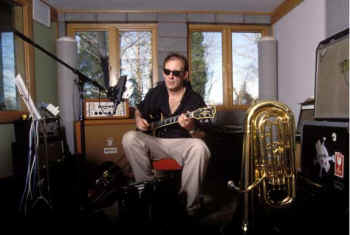
photo by Abigail Seymour Photography no use without permission |
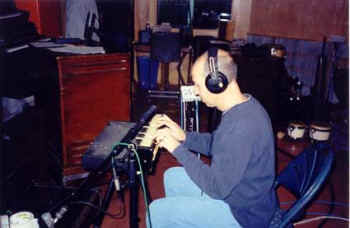
|
Anything
Goes
When novelist Madison Smartt Bell gets together for five days with North
Carolina rock legends Don Dixon
and Mitch Easter to make a record, the results
are inspiring.
GIVE A LISTEN
To hear the results of the collaboration, go to the Gaff Music Web site – http://www.gaffmusic.com/–
to listen to cuts of Anything Goes and two other songs recorded last
month.
|
from: The Independent Weekly
KERNERSVILLE –
Something happened late on the third night of a recording session last month
in a studio just off Main Street that showed how sometimes, if you mix together
enough creative energy, talent and experience, and shake it up in fresh ways,
you might get lucky and surprise even yourself.
This was no conventional project: Acclaimed novelist Madison Smartt Bell and
poet Wyn Cooper joined North Carolina rock legend Don Dixon (producer and
bassist) and a crew of top-drawer musicians to make a record out of songs Bell
and Cooper wrote together, half on a lark, for Bell's novel Anything Goes.
Just to make it all really strange, Bell was on lead vocals (and rhythm
guitar). Cooper, who wrote the words to the songs, kicked in with readings of
some of his poetry, funked-up so it fit in with the mood of the record, dark and
weird and bluesy with song titles like "40 Words for Fear" and
"Room Full of Tears" and "The Girl in the Black Raincoat."
"I would just love for this record to be a part of some sort of overall movement of a return of art in pop music," said Mitch Easter, who hosted the five-day sessions in the sleek, million-dollar studio he and Shalini Chatterjee built in their back yard. "The word pop has become synonymous with possibly the worst music ever made, but what I see pop music as is just non-high-brow music, which means a vast array of culture for everybody."
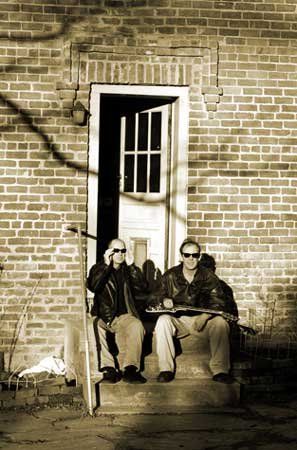
Left alone
That third night when everything came together, Dixon took a few hours off to
head to his daughter's dance recital a county or two away, and it was like a
rainy day at grade school when the substitute teacher heads to the lounge for a
smoke and all hell breaks loose. Easter and the others did not let loose with
any paper airplanes, or electrocute any cats, or fill any chalkboards with
spectacularly obscene limericks. They just grinned as if they had.
You almost had to think Dixon had it all planned. Three decades have passed
since he burst onto the scene as bassist and vocalist of the Chapel Hill band
"Arrogance," and if Dixon knows enough to be bored by fame, he also
knows enough to remember that feeling of breaking through with something. He has
the itch to do it again. You can see it in his eyes, in his quiet, thoughtful
smiles and in the way he almost hops in his chair when he pops open the pull tab
on yet another of his fizzy musical ideas.
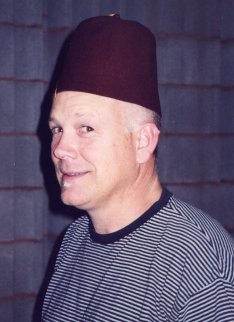
Dixon, fez
"You're not worried about whether someone's grandmother is going to put
this on at their wedding reception," he said one day during the sessions.
"You care about whether someone is going to put this on and pick up the
headphones and really listen. It only has to be a few people. Anybody who writes
poetry in the face of no one giving a rat's ass knows what I'm talking about.
"The appeal of working on this is you have two smart guys who have a lot
of ideas and have created these things, and now we just have to figure out how
to make this work. The groove and feel side of music is not necessarily an
intellectual process, but to create these things you have to create an
environment where you have those levels."
Sometimes that means ducking out, which felt in a way like it was one more
mad Dixon scheme to channel the creative process. Before he hit the road to
watch his daughter, he urged the crew to carry on without him. Maybe, he
suggested in an offhand whisper, they could do something to jazz up Cooper's
spoken-word contributions.
Cooper also wrote the words to a poem called "Fun," which became a
song called "All I Wanna Do," which became Sheryl Crow's breakthrough
hit. He was no stranger to the music business (and that earned him respect) but
his voice was. No one was going to say anything, but Cooper sounds like a poet.
He enunciates. His voice rings. It rises and falls. But it does not rock. If, as
Sonny Boy Williamson once said, the blues are something you come in con-TACT
with, this was a voice that needed to broaden its experience.
No problem. The boys were there to help. They soaked up some enchiladas and
beer down the road in the smoke-friendly rear room of a Mexican restaurant that
had stocked up on fluorescent lights bright enough to zap even the hardiest
insect, Star Wars-style, then got down to some serious noodling.
Before you knew it, percussionist Jim
Brock, the linchpin to everything that
happened that week, was stretching out like an aerobics instructor. It was quite
a sight, considering Brock was the tallest of the bunch, at a little over
6-foot-2, and usually sat meditatively behind his drum kit, dreaming up
something just off-kilter enough to ring Dixon's bell, or folded his long limbs
into a comfortable pose on the big sofa in the control room.
But now Brock was playing the short wave. He fiddled and fussed with the
knobs until he found just the right shard of static-fringed noise, coming out of
the night like a hyena call. Now, to make music, he was using his body as an
antenna, extending then contracting, extending then contracting, and in the
control room, Easter and the others shook their heads with pleasure.
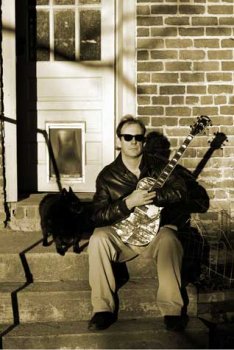
photo by Abigail Seymour Photography no use without permission
Dreamy and weird
There was no need to talk about how right the sound was. Something dreamy and
weird and edgy was taking shape, and everyone knew it. This was even more fun
than the day before, when Brock had tapped out a rhythm on the spiral metal
staircase rising out of the back of the studio, using nothing but his hands.
"When you do this all the time, and you've done it for years, a lot of
it gets kind of nuts and bolts for you," said Brock, also co-producer.
"Then people come in who don't do it all the time, nonprofessionals, and
they still have that sparkle that you used to have, like I had when I was a kid.
"I still have that love and everything, but time has kind of smoothed
the edges out. You see that gleam of excitement in their eyes, and you kind of
feed off of that a little bit. It's the same thing when I play the stairs.
That's a whole new thing. It's still music, and I'm still doing what I do. But
it's fresh. I've created something that wasn't out of something that is
different."
But was this too out there? Was the radio and the other effects too pulsing,
too reverbed, too weird? Maybe--but so what?
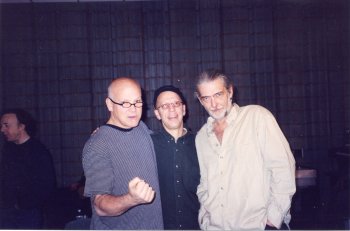
Easter, Dixon, Frank, Brock
"I think we owe it to ourselves to preserve this little piece of found
art," Easter said, hands on the console as always.
What else did the cut need? How about a banjo solo?
Chris Frank was only too
happy to oblige. He'd already had a tuba solo, the day before, and a trombone
solo and, oh yes, played the accordion and the ukulele. He'd played the electric
piano and the upright piano and the Hammond B-3 organ. Dixon rides Frank harder
than Brock or Easter, and has a way of squeezing everything he can out of him.
But not then. Not that night. Dixon was gone, and this was about Frank having
fun. As soon as Easter assured him they weren't kidding, he really got to play
"Sweet Sue," he ran off to get his banjo, wasting no time.
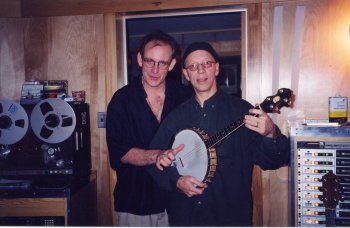
Bell, Frank
Scott Beal slid out of his chair and was lying flat on his back, laughing so
hard his health seemed in danger. If anyone could laugh, it was Beal, a cross
between original Grateful Dead singer Pig Pen McKernan and Animal House-era
John Belushi. Beal was the one paying the bills. He was the one making this
happen. He was the one with the record label, Gaff Music, designed for just such
projects as this, a quirky mix of musical talent and the life knowledge and
soulfulness of an old-school, get-out-there-and-live novelist like Bell.
Late-night music for late-night people, Beal called it later, once he heard the
final mix, and it's hard to argue with that.
"It was great fun," Easter said later. "It's really great when
you've been listening to normal instruments, and you have to be concerned about
being in tune, and singing the right words, and your timing and all that, and
then you shift gears and you want it to sound as destroyed and wrong as
possible. That's a great relief after a while. It's nice to have an evening like
that thrown in."
This banjo solo was no runaway train. Oh no. Easter brought it in and out
like a radio signal fading in and out on a late-night drive across the
heartland. It was there, and then it wasn't, and when it was gone you wondered
if you had actually heard it or if your own overactive imagination had somehow
conjured it out of nothing. That was the idea, of course. And it worked.
"What are we going to do after we grow up?" Frank called out to no one in particular, back in the control room.
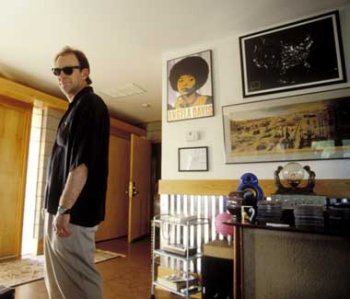
Dark places
Easter had a Christmas-morning grin as he sat and listened at the big console
he imported from Britain once the BBC gave up on it. It's a famous model, one of
only a few around, and Easter could work it even when he was nonchalantly
knocking off a crackling little guitar solo. Listening to the "Sweet
Sue" playback over Cooper's reading of lines like "I sing at the top
of my one good lung," Easter had a smile loaded with both mischief and
satisfaction. He's a reader, a huge fan of The New Yorker with books
piled up all over his restored 19th century house, but even someone who loves
the written word can grin at the way a musical instrument can steal the show.
Cooper, for his part, couldn't stop laughing, he was so happy at the way these
musicians had dressed up his words as few poets--anywhere, any time--have ever
been lucky enough to experience. This was taking the mood of his words, often
bleak and cryptic, and spinning something new and different out of it that still
feels like part of the original.
"It's not like there's a scale of darkness that just goes down from
black through brown through gray, but in musical terms, there are dark
places," said Frank. "Wherever this emanates from, it's someplace I
haven't been, but it's cool. I think people are going to listen to this album
and say, 'Wow, where was I?' Like they went to a movie or something. ... It's a
one-of-a-kind project, I think. There are some poetry albums, and some
songwriters who are more poetry slanted, but I think this is unique. It's a new
way of looking at poetry."
There's no telling what will come of the record when it hits stores in a few
months. Beal and Dixon can't even decide whether to stick with its working
title, Anything Goes--a good title, evoking not only Bell's novel, but
also the only bang-the-cow-bell-harder, mostly straight-ahead rocker on the
record, also called "Anything Goes." But a novelist-as-singer record
is bound to attract some attention.
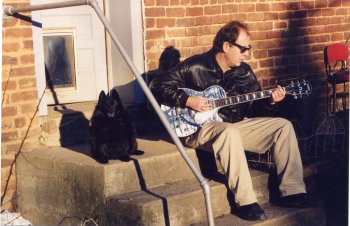
Over the five days the tracks were laid down in the Easter studio, a sense of
elation steadily built. Maybe that's how it always goes when people make
records. I have no idea. This was my first recording session. But hanging around
as I did, more than 12 hours a day most of the time, I had a chance to see the
little, telling moments that give away private fears. What I saw was a lot of
talented, smart people who were just pleased as hell to be working together on a
project that was all about making something that sounded good to them, and maybe
to a few others.
"There's been such a focus on the commercial," Easter said.
"Everybody I know is dying for something with some substance. So here's
something with substance. A lot of people would love to hear it. Will the
mechanism be out there for them to get to it? I don't know. ... I think this
will do something. I really hope it does. That's what I'd like is just for it to
do something, to remind people that this sort of pop-music form is quite
adaptable and can be used to transmit some real information.
"Remember on The Beverly Hillbillies, they were making fun of
teenage rock music lyrics?" he said. "They had that 'Ooh Baby'
segment, which was really funny. Jethro has like a gold-lame suit and the song
went 'Ooh baby,' and that's all he says. When we go over to the little corporate
gym over here, and they have the hits station going, that's pretty much the song
they have going now. It's produced a little differently, but as far as I can
tell, they're quoting Jethro's lyrics pretty heavily.
"The 'Ooh baby' factor is like the only factor now in this incredible
way. I do think we'll look back on the late '90s and the early part of this
decade as an astonishing time for low-grade pop music. But it doesn't seem to be
satisfying anybody. So I think it's gone on like this long enough, and things
that are actually interesting have a chance again."
Limbering up
Bell, who runs the creative writing program at Goucher College, made his name
as a novelist writing hefty books like All Souls' Rising, a period piece
set in Haiti that was a finalist for the 1995 National Book Award. He likes to
take time out between long works of historical fiction (the new one has already
hit 1,000 pages, and it's not finished). That means limbering up, creatively and
otherwise, with shorter, more playful works.
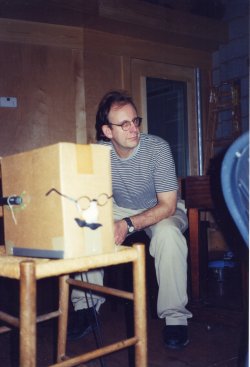
"Anything Goes" started that way, and turned into something else.
Bell wanted to get Cooper writing fresh material, and asked him to write lyrics
to use in the novel, which they might later be able to sell, along with the
music Bell wrote for the songs. Cooper, a friend of Bell's since they were both
in the writing program at Hollins College 20 years ago, thinks the itch to make
music was stronger for Bell than the desire to add to his novel.
"His hidden agenda in all this was to set these songs to music,"
Cooper told me last summer. "He didn't really want the lyrics for the
novel. If he tells you that, he's lying. When I sent the first one, I got a
cassette back in about four days. He's set it to music already."
Soon they had a whole pile of songs, and weren't entirely sure what to do
with them. Some critics were distracted by the youthful narrator of Anything
Goes experimenting with songwriting--and having the lyrics appear as part of
the novel. (Bell and Cooper later cut a demo tape of the songs, which were
available to readers via Bell's Web site.)
I was given the novel to review for the San Francisco Chronicle last
summer, and having never met Bell or Cooper, I read it fresh--and thought it
worked beautifully. To me, it felt like a novel about being trapped inside a
box, and finding a way to knock loose a few holes and tunnel through to
something else. The sense of discovery was the point, it seemed to me, and came
through in what felt like an untold back story on where the songs in the book
came from. (I assumed at first that back in their school days, Bell and Cooper
had composed these songs and never found anything to do with them.)
Here's what I wrote for the Chronicle:
"About halfway through this deliciously entertaining novel about an
unexceptional blues and rock band and the series of dive bars it calls home, the
coked-up lead guitarist walks off in a huff just before a gig. This time, he's
gone for good.
"Desperate, the band turns to a squirrelly con-man character with
slicked-back hair and a 'fairly pleasant, hound-dog expression.' He's a loser,
the kind of guy who asks for a cigarette, pockets the pack, and then gives you
his best shit-eating grin when you ask to have them back. But he can play. The
dude can flat-out play.
"'A guy like that, he didn't have to play much to let you know what you
were dealing with,' the bass-player-narrator tells us. 'Five notes, one note, it
hardly mattered. Perry called this the authority, but I thought it was his time,
the rock-solid time tuning his hands to his head and letting anybody listening
know that this one did have the mojo.'
"That's the same feeling the reader gets early on about Madison Smartt
Bell in Anything Goes, his 13th book of fiction. Bell has the mojo, he
can flat-out play, and the tunefulness and life-knowledge and honest emotion all
come ringing off the page. The question, if you've got the mojo, is what to do
with it."
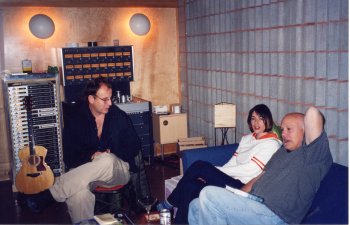
Bell, Shalini, Dixon
Later, following up as a reporter, I found out that Beal, a fan of Bell's
writing for years, actually wanted to make a record. Beal got the demo tape from
Bell, and sent it on to Dixon, best known for producing REM's first records,
along with Mitch Easter. Dixon right away agreed with Beal that the
music--featuring Bell on guitar--was intriguing. The only trouble was, they
didn't think much of the vocalists on most of the tracks. What they did like,
however, was the unbuffed, unpolished barfly voice on two of the tracks,
"On Eight Mile" and "40 Words for Fear." Bell was shy about
admitting that he was the one singing on those tracks.
"They said, 'We were listening to this and we wanted that guy who sang
those two songs--Can you get him?'" Bell remembered.
"I thought they were joking. I refused to answer that question for about
three rounds. And then I finally said, 'Yeah, I can get that guy.'"
Beal was surprised when he found out the truth.
"I told him, 'Well, you can't sing, but it's the WAY you can't sing
that's good,'" Beal said. "It has sort of a dark, sleazy feel to it.
They had about three or four people doing vocals on there, and this one voice
stood out. It was kind of a combination of Leonard Cohen and Tom Waits."
Catchy – and haunting
That was what Beal said in the summer. But those five days of jamming in
Easter's studio, just down the road from an auto repair shop and across the
street from a funeral home, showed the power of an idea: Dixon, the producer
with a glimpse of the barely possible, imagined something potentially enduring
in what others might dismiss. Bell had trouble seeing it, but he was willing to
go along with Dixon's vision. And Bell's singing became richer and darker and
more confident over the five days; some of the cuts are even catchy, or
haunting, which may be different sides of the same thing.
"We were lucky," Bell said late in the sessions. "I had no
idea what to expect coming in. I was nervous in a way. I sort of worked on my
head a little before I came down. I thought, I've got to tell myself that my
playing doesn't really matter and is dispensable and since I don't really think
of myself as a singer, I figure I can do that part and not choke. And that
worked.
"Never did I think this would happen. We were thinking maybe we'll get a
song here and a song there, established performers might pick this up. I just
truly thought when they started saying they wanted me to do it that it had to be
a joke. However, I was willing to try. I guess that's where you plug in that
line about I know you can't sing, but it's the way you can't sing that's good.
... There's something that Dixon is hearing in my inadequacies that works in his
idea of the music, and I'm getting detached enough from it now that I can hear
that, too."
That hang-dog expression Bell attributed to the guitar-for-hire in Anything
Goes might have some autobiography to it. Bell has one of those great faces,
part basset hound, part treasured teacher, that's the last one you'd single out
in a room full of people, but somehow also the first one you notice. He's
understated and low key without in any way undercutting his quiet authority. If
he was going to show up in a Hollywood movie, he'd be the new kind-hearted
teacher of the dark arts at Hogwarts Academy, teaching Harry and his mates
levitation or shape-shifting, all without an ounce of self-congratulation.
That first morning, coffee in hand to ward off the effects of the previous
night's eggnog, he good-naturedly cut off Dixon almost before he could get down
to talking about how he saw the music they were going to be making. "I
think a couple of these blues things are going to be OK, we just have to make
them kind of weird," Dixon said.
"I think this is the right time to mention that my timing really sucks,
and I can't count," Bell said. "It's kind of like a stutter."
Everyone laughed, and it was as if a background layer of anxiety or potential
vying of wills evaporated then and there and never came back. Bell was not
someone who was ever going to try to be something he's not, it was clear. Cooper
gets co-billing, and that's fair enough, but this was mostly about Bell and his
gifts. His timing--as promised--was nowhere near up to that of a professional
musician. That first day, realizing he had to play against a loop, funky and fun
in its syncopation, unforgivable in its regularity, he froze up a little, and
had to practice for quite a while before he felt comfortable. But he found a way
through that.
Not musical McNuggets
The worst thing about most contemporary pop songs is the icy loneliness of
hearing music that sounds devoid of an actual human presence. A singer like
Celine Dion can emote on cue without ever seeming to know much about what a real
emotion feels like. She's "feeling," oh baby she's
"feeling," count the Grammy, but it's emotion in the way that
McNuggets are food, stamped out of a mold, relentlessly and remorselessly.
Bell's voice does not have this problem.
"I hear somebody that means what they're
singing," said Jim Brock, the percussionist and co-producer. "I think
there's a lot of singers out there that could learn from that, a lot of really
great singers that could learn from that."
Brock talks in a low-key drawl and conserves his words so carefully, it seems
downright unfriendly to question what he says about others learning from Bell.
It sounds a little crazy, sure, but why not? Maybe all he means is that others
can learn something about trusting themselves.
"I think his delivery is completely effective," said Easter.
"There are a lot of ways to be a singer. It's the closer you get to Star
Search, the more you want to run for cover. That's not to say he can't
sing--he sings cool. He's not like a guy who would be in a cover band or
something, but he definitely has a real identity, and that's what you want. He
has that sort of well broken-in, been-around-the-block kind of sound in a way
that's very effective. He doesn't sound tired, but he sounds like a
grown-up."
What's also clear is that some people will be put off by that unlovely
quality in Bell's voice that gives it its honesty, and locates it for us as
listeners. It would be wrong to say that Dixon and the creative team behind this
record are unconcerned about people who actively dislike listening to someone
like Bell, singing in a way that could not be more different than, for example,
the airy world of Kenny G and that hapless guitar player in Animal House
who croons "I gave my love a cherry" and then watches a man in a toga
smash his guitar against a wall and mutter, "Sorry." In fact, these
people WANT strong reactions. That's the point.
"This is a recurring issue with me," Dixon explained one day during
the sessions. "Your enemies, the people who think you suck and are the
worst piece of shit ever to crawl out from under a rock, they define you more
than the people who just slavishly love you. They make the people who DO get you
have something to care about. If you can get some real hatred built up, then you
have a chance of defining yourself as a personality.
"It's the worst thing about popular culture, it tries to have too broad
an appeal. People want everyone to love them. I've seen totally talented but
incredibly insecure musicians worrying about some sack of shit person who
doesn't matter at all in their life, or ever will, and have them change
something totally good, because someone told them to do that.
"It's one's thing to get opinions from people you trust about something.
Not everything we crap out is good. We need filters. But it's another to allow
some idiotic comment from your accountant to change what you're trying to
accomplish. People thought REM was the biggest piece of shit, your typical sit
around a music store on Saturday and copy Joe Satriani, and thought they just
sucked. They didn't get it."
What will Don do?
The REM reference offers a hint that, like anyone putting themselves on the
line creatively, Dixon would love for a lot of people to love this record. Heavy
radio play would not be a bad thing, not for him, not for Bell and Cooper, not
for the other musicians--and, hell, not for the airwaves, either.
But as good as someone like Dixon has become at riffing with words in a good,
edgy, quotable way, there are always going to be discrepancies between the way
someone wants to be seen and the way they really are. Dixon might be the
smoothest, most people-friendly control freak around, a man with a genius for
relating to disparate personalities, each with just the right touch, but a
control freak is still a control freak. Or is he?
The test of the whole project came after that orgiastic third night of the
sessions, the night of the short-wave radio fuzz noise, and the banjo solo
coming in and out, and the big grins and the sense that real life just wasn't
supposed to be this fun. There was a creative buzz that night that changed
everything, added one more layer of depth and involvement to the music.
But how would Dixon respond? There was a heavy "Wait Till Your Father
Gets Home" vibe as the hours ticked away, and the producer's expected
return approached. Frank, always good for comic relief, tried to explain his
burst of nervous energy: "I'm just awaiting the arrival of the guy who
DIDN'T have a big steak dinner and a couple beers, and is going to be ready to
go."
Bell was especially eager to hear what Dixon would make of this wild, free
stuff. It was all part of Dixon's vision, clearly, and yet it wasn't. There was
a riddle here. Bell wanted to turn the page. He wanted to know what happened
next. But instead, Dixon cruised back into the studio, and a new song was begun,
with no time to waste listening to stuff already in the can. Like all the songs,
this took shape in a basic way, with Bell and Dixon and Frank and Brock sitting
around in the main studio, taking what Bell had written, musically, and building
on it, listening for more of it, exploring it.
But what about the weird stuff? The answer came the next day. Dixon had
gotten up early, and gone wild in the studio. He'd taken their freedom and
inspiration, and done them one better. As determined as he was to keep Cooper in
as an equal partner, he did his own reading of one of his poems, and strung it
together as a bridge between two songs. The room was dead-quiet as everyone
listened. Both Bell and Cooper were overcome.
"I was stunned," said Bell. "It brought tears to my eyes. Wyn
was serious when he said, 'Did I write that?'"
Later, Dixon would hedge on whether he was going to use his version of the
poem, rather than Cooper's. But everyone, including Cooper, loved his reading so
much, he's going to have to keep it and he knows it. It's just too good. If that
takes him a little time to accept, it's only fitting. Just as Bell and Cooper
came over from their territory, to play with these musicians in the best sense
of the word, so, too, the musicians were getting a taste of something different.
Dixon was reading poetry, and sounding great doing it.
This infusion of creative energy showed up most in Bell. The night Dixon came
back into the studio after the time away, Bell had some time to himself, and
picked up a guitar and started strumming. He had an itch to do something with an
idea kicking around in his head, and started putting chords together.
I found him that night out in the sofa of the front room to the studio,
strumming away happily, head down, lips pursed. He laughed shyly when he
admitted he was working on something new, but he was pleased, too. He liked what
he had. To my ear, it sounded less weird and dark than a lot of what had been
recorded during the session, but Bell told me no way, and I didn't press the
issue.
The next day, the song was added on to the record, as a short farewell called
"Wave Goodbye." The guitar has a rich, palpable sadness to it, a
mournfulness that is more lyrical than anything else on the record. But it's
beautiful. Hauntingly beautiful. And it works. Somehow it caps off this strange
effort, this odd collaboration of creative types lashing together something they
hope will float. "No man is an island shout the waves all around me,"
Bell begins, and by the end, he's saying "I wave hello, I wave
goodbye," and that's the end, sooner than we expect.
"It's like Madison said, it's the difference between throwing the
football around in the backyard, and all of a sudden you're in an NFL
game," Brock said. "If all of a sudden they sing something or play
something they like, they feel proud of themselves, and you see that grin. It's
cool. You don't want to lose that childlike attitude. But we all do, eventually."
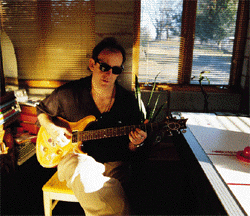
photo by Abigail Seymour Photography no use without permission